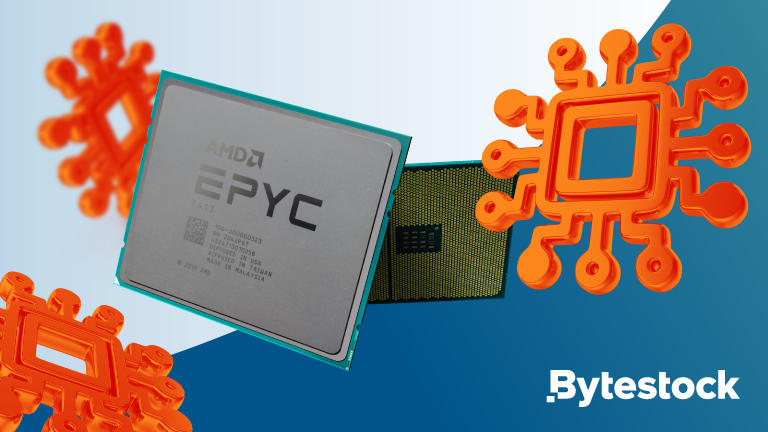Random Access Memory (RAM), commonly known as 'memory', is a high-speed component that temporarily...
What is a CPU Processor? Explained…

A CPU (Central Processing Unit), or simply ‘processor’, is the core component of any computing device—the brain of your device, if you will. It sits in a socket on the system’s motherboard and processes the billions of calculations required to run a computer. It works alongside the other components, including the random access memory (RAM), which temporarily stores information the CPU needs to process.
What is a Central Processing Unit?
A CPU consists of billions of microscopic transistors placed on a single chip. The transistors allow the CPU to make all of the calculations needed to run any programme on your system. In the very early days of computing, CPUs were very different to what we have now. As technology has advanced, the size of a CPU has gradually become smaller and smaller, while also becoming immeasurably more powerful.
What does a CPU Do?
A CPU takes instructions from programmes and applications and performs the calculations necessary to form a result. The process has three key stages. These are fetch, decode, and execute.
Fetch: The CPU will fetch instructions from the RAM.
Decode: The CPU deciphers what the instruction is.
Execute: The CPU executes the instruction using the relevant parts of the CPU.
The CPU is required to make everything happen, from starting up your PC to shutting down, and every action in between.
What are the three components of a CPU?
When searching the market for a CPU, there are three key areas that you should consider before making the final decision.
These are the three Cs:
Cores: Back in the day, CPUs only had one processing core. During the early 2000s, Intel successfully integrated two processing units onto a single chip, coining the term 'cores' to indicate the number of CPUs on a CPU (we hope you're still with us!). A modern CPU can consist of multiple cores (multiple CPUs within one physical unit), allowing it to perform multiple instructions simultaneously. Today’s CPUs are almost always at least dual-core or 4-core, with 6 and 8-core becoming more standard. With more high-end CPUs, you can find 10, 12, 16, 20, and even 28-core CPUs that offer incredible levels of processing power.
Clock Speed: Alongside cores, the other most advertised feature is the clock speed. You will see this featured on product listings as “Gigahertz” (GHz). This effectively determines how many instructions a CPU can handle in a second. If you find two processors within the same generation that share similar stats and features, a faster clock speed will be the thing to look for, as a faster clock speed means a faster processor. One thing to bear in mind is that a CPU from 2012 with a 3.00GHz clock speed isn’t always going to be as fast as a CPU from 2020 with a 2GHz clock speed.
While clock speed is an important factor, it is not the sole determinant of a CPU’s performance. Architectural improvements, increased core and thread count, larger cache sizes, advanced manufacturing processes, and better overall efficiency make modern CPUs much faster and more capable than older CPUs, even if their clock speeds are lower.
Cost: A common question that's asked when shopping for processors is, “How much do I need to spend?”. As a general guideline, unless you are looking to build a powerful workstation that can run several programmes at once or a mega gaming PC, you most likely won’t need to spend much more than £300.
If you’re not quite sure what you require, get in touch with our team for expert guidance.
Is the CPU the most crucial component in your system?
Earlier, we called the CPU 'the brain'. So, surely, it should be the top priority when building a PC or a server. After all, a human wouldn’t be able to survive without a brain!
Indeed, without a processor, your system wouldn't function at all. However, it's also important to consider other parts of the system. No matter how expensive and powerful your CPU is, it won’t be able to store information like a storage drive, process intense graphics tasks, or even work to its maximum capacity.
It’s important to find a balance between all of the parts that will make up your system. If you have any questions regarding CPUs or anything to do with IT systems, call our team for expert advice.
We have a range of CPUs from Intel and AMD at competitive prices!






-1.png?height=200&name=MicrosoftTeams-image%20(21)-1.png)